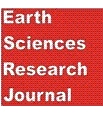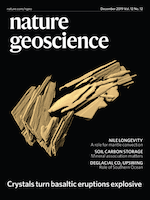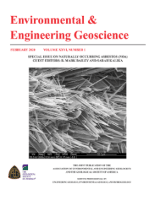
Journal of the Korean Earth Science Society
Scope & Guideline
Advancing Earth Science Knowledge
Introduction
Aims and Scopes
- Geological and Geophysical Research:
The journal covers extensive research on geological formations, fault mechanics, seismic studies, and geophysical properties of the earth, providing insights into tectonic movements and geological history. - Climate and Environmental Science:
Research addressing climate change, atmospheric conditions, and environmental impacts, particularly in the context of East Asia, is a core focus, highlighting the region's unique climatic challenges. - Hydrology and Hydrogeology:
Studies on groundwater characteristics, hydrological modeling, and water quality assessments are emphasized, reflecting the journal's commitment to understanding water resources in the Korean context. - Remote Sensing and Geospatial Analysis:
The journal publishes works utilizing remote sensing technologies and geospatial analysis to monitor environmental changes, assess natural disasters, and analyze coastal and marine ecosystems. - Earth Science Education:
An important aspect of the journal involves exploring pedagogical strategies and educational frameworks for teaching earth sciences, emphasizing the development of inquiry-based learning and computational thinking in educational settings.
Trending and Emerging
- Impact of Climate Change:
There is an increasing focus on the effects of climate change on regional environments, particularly in East Asia, with research exploring atmospheric warming, extreme weather events, and their implications for ecosystems and human activities. - Application of Machine Learning and Data Science:
The application of machine learning techniques in earth sciences, particularly for predictive modeling and data visualization, is gaining traction, reflecting broader trends in scientific research towards data-driven methodologies. - Educational Innovations in Earth Science:
A growing interest in pedagogical approaches that incorporate technology and inquiry-based learning reflects an emerging trend to enhance earth science education, particularly in the context of integrating computational thinking. - Marine and Coastal Research:
Research related to marine ecosystems, including studies on ocean acidification, coastal erosion, and the impact of human activities on marine environments, is becoming increasingly prominent, addressing critical environmental issues. - Hydrological Modeling and Water Quality:
There is an emerging emphasis on advanced hydrological modeling and assessments of water quality, driven by the need to address water security and pollution issues in a rapidly changing climate.
Declining or Waning
- Historical Geological Studies:
Research focusing on historical geology and paleontology appears to be less frequent, possibly overshadowed by more pressing contemporary issues such as climate change and environmental monitoring. - Geological Hazards and Risk Assessment:
While still relevant, the volume of studies specifically addressing geological hazards, such as landslides and earthquakes, has decreased, indicating a possible shift towards more proactive environmental and climate-related research. - Geochemical Analysis of Sediments:
Papers centered solely on geochemical analyses of sediment cores have become less prominent, as interdisciplinary approaches that combine geochemistry with climate and ecological studies are more favored.
Similar Journals

Journal of Geography-Chigaku Zasshi
Unveiling Earth's Secrets, One Article at a TimeJournal of Geography - Chigaku Zasshi is a distinguished publication that serves as a crucial platform for the dissemination of research in the realm of geography and earth sciences. Published by the TOKYO GEOGRAPHICAL SOC in Japan, this journal is indexed with an ISSN of 0022-135X and an E-ISSN of 1884-0884. With a scope that includes Earth-Surface Processes, Geography, Planning and Development, Geology, Geophysics, and Global and Planetary Change, it provides comprehensive coverage of pressing geographical issues. Although it holds a Q4 ranking in multiple categories as of 2023, the journal presents an opportunity for researchers, professionals, and students to contribute meaningful findings in a diverse and competitive landscape. The Journal of Geography actively promotes scholarly dialogue by embracing the complexities of our planet and encouraging innovative approaches to geographical inquiries. This open-access journal aspires to bridge gaps and foster collaboration among scholars worldwide, underscoring its importance in understanding and addressing contemporary geographic challenges.

JOURNAL OF THE GEOLOGICAL SOCIETY OF INDIA
Fostering scholarly dialogue in Earth and Planetary Sciences.JOURNAL OF THE GEOLOGICAL SOCIETY OF INDIA, published by Springer India, serves as a pivotal platform for researchers and practitioners in the field of geology. Established in 1979, this journal has been instrumental in advancing geological research throughout India, showcasing both regional studies and cutting-edge global research. With its Category Quartile ranking of Q3 in the geology category for 2023, and a significant Scopus rank of 171 among 321 journals in Earth and Planetary Sciences, it remains a respected source of scholarly activity. The journal is dedicated to the dissemination of original research articles, reviews, and case studies that encapsulate the dynamic scope of geological science, thus contributing to the understanding of geological phenomena. Although currently not offering open access, the journal maintains a commitment to high-quality scholarship and aims to engage a diverse readership, enhancing the knowledge and practice of geology across various disciplines.

Frontiers of Earth Science
Transforming Understanding of Planetary ProcessesFrontiers of Earth Science is a prominent academic journal in the field of Earth and Planetary Sciences, published by Springer. With an ISSN of 2095-0195 and an E-ISSN of 2095-0209, this journal serves as a significant platform for researchers and professionals to disseminate their findings from 2007 to 2024. It is recognized for its impactful contributions within the category of Earth and Planetary Sciences, boasting a respected Q2 ranking in 2023. With a Scopus ranking of 64 out of 195, placing it in the 67th percentile, Frontiers of Earth Science continues to drive academic dialogue and innovation. The journal is dedicated to exploring a diverse range of topics, including geology, meteorology, and environmental science, and amplifying the understanding of Earth systems through rigorous research. Located in New York, USA, this journal embraces an Open Access model, ensuring that groundbreaking research is readily available to the global scientific community, thereby enhancing its accessibility and impact.

Austrian Journal of Earth Sciences
Innovating Insights in Paleontology and StratigraphyThe Austrian Journal of Earth Sciences, published by SCIENDO, is an esteemed open-access journal specializing in the disciplines of geology, paleontology, and stratigraphy. With an ISSN of 2072-7151, this journal has established itself as a significant platform for innovative research and scholarly communication in the earth sciences. Since its inception in 2007, it has continuously expanded its influence, achieving notable rankings in the Scopus database—#113 in Geology, #42 in Paleontology, and #21 in Stratigraphy, demonstrating its commitment to high-quality publications. The journal holds prestigious quartile rankings of Q1 in both Geology and Paleontology and Q2 in Stratigraphy as of 2023, reflecting its impact and relevance in the scientific community. Researchers and students alike are encouraged to explore and contribute to the evolving discourse within this dynamic field, as the Austrian Journal of Earth Sciences fosters collaboration and knowledge sharing across global platforms.

Earth Sciences Research Journal
Advancing Knowledge for a Sustainable PlanetThe Earth Sciences Research Journal, published by the UNIV NACIONAL DE COLOMBIA, serves as a pivotal platform for the dissemination of knowledge in the diverse field of Earth and Planetary Sciences since its inception. With an ISSN of 1794-6190 and an E-ISSN of 2339-3459, this Open Access journal has been committed to providing unrestricted access to high-quality research since 2004. Located in Bogotá, Colombia, it has gained recognition within the academic community, achieving a Q3 quartile ranking in Earth and Planetary Sciences and notable Scopus rankings, which further underscores its relevance and reach. Its scope encompasses varied research topics, making it an essential resource for researchers, professionals, and students alike, seeking to contribute to or stay informed on the latest developments in the Earth sciences up to the year 2024. The journal not only anticipates cutting-edge research but also emphasizes collaborative dialogues among global experts, driving forward the conversation on critical issues facing our planet.

Nature Geoscience
Transforming Insights into Action for Our Planet.Nature Geoscience, a premier journal published by NATURE PORTFOLIO, provides a platform for the dissemination of high-quality research in Earth and Planetary Sciences. With an impressive impact factor reflecting its significance — ranking in the 99th percentile and positioned at #1 out of 195 in Scopus Ranks within its category, this journal is a leading authority in its field. Since its inception in 2008, it has fostered interdisciplinary collaboration, addressing critical challenges such as climate change, natural disasters, and resource management. Although it does not offer Open Access, the journal is accessible through various research libraries, ensuring that vital findings reach a broad audience. The journal's esteemed reputation in the Q1 quartile of Earth and Planetary Sciences makes it an essential resource for researchers, professionals, and students aiming to advance their understanding of geoscientific phenomena.

GEOSCIENCES JOURNAL
Connecting Researchers to Tackle Environmental Challenges.Welcome to the GEOSCIENCES JOURNAL, a pivotal publication in the fields of Earth and Planetary Sciences and Environmental Science, proudly presented by the Geological Society of Korea. Established in 1997, this journal has become a prominent platform for researchers, professionals, and students, offering a rich collection of peer-reviewed articles that explore a diverse array of geoscientific topics. With an impressive Q2 ranking in both Earth and Planetary Sciences and Environmental Science categories for 2023, it stands as an essential resource in the academic community. Though it operates under a traditional subscription model, GEOSCIENCES JOURNAL remains dedicated to advancing knowledge through rigorous research. Addressed from its headquarters in Seoul, South Korea, the journal aims to foster a deeper understanding of geosciences, encouraging innovation and collaboration in tackling today’s environmental challenges.

Carpathian Journal of Earth and Environmental Sciences
Championing High-Quality Research in Earth SciencesCarpathian Journal of Earth and Environmental Sciences is a distinguished academic journal dedicated to advancing the interdisciplinary field of Earth and environmental sciences. Published by the Carpathian Association for Environment and Earth Sciences, this journal plays a pivotal role in disseminating high-quality research focused on the dynamic interactions between geological processes and environmental changes. With an ISSN of 1842-4090 and an E-ISSN of 1844-489X, the journal is indexed in Scopus and holds an esteemed Q3 quartile ranking in both Earth and Planetary Sciences and Environmental Science categories as of 2023. Since its inception in 2008, the Carpathian Journal has provided an open access platform for researchers, professionals, and students to share insights, foster collaboration, and engage in critical discussions on pressing environmental issues. By continuously contributing to the body of knowledge in this field, the journal not only enhances academic discourse but also promotes sustainable environmental practices across Romania and beyond.

Vietnam Journal of Earth Sciences
Unveiling Insights, Inspiring Earth Science ResearchThe Vietnam Journal of Earth Sciences, ISSN 0866-7187, is a premier publication from the Publishing House Science and Technology based in Viet Nam, dedicated to fostering advancements in the field of Earth and Planetary Sciences. Operating under a Q2 ranking in the 2023 category of Earth and Planetary Sciences (miscellaneous) and positioned at Rank #62 out of 195 in its general category on Scopus, this journal serves as a critical platform for researchers, professionals, and students seeking to disseminate and engage with high-quality scientific findings. Despite being part of the non-open access model, the journal is committed to providing compelling content, encompassing a range of topics from geological hazards to environmental sustainability, ensuring its relevance and contribution to both local and international scientific communities. With coverage that spans from 2018 to 2024, the journal is poised to continue its role in addressing pressing Earth science issues and fostering collaborations among scholars in an increasingly interconnected world.

ENVIRONMENTAL & ENGINEERING GEOSCIENCE
Bridging Knowledge Gaps in Environmental and Engineering GeoscienceENVIRONMENTAL & ENGINEERING GEOSCIENCE, published by the Geological Society of America, Inc, is an esteemed peer-reviewed journal duly established to advance the fields of geotechnical engineering, environmental engineering, and broader earth sciences. With an ISSN of 1078-7275 and an E-ISSN of 1558-9161, this journal disseminates high-quality research and innovative methodologies that address pressing environmental issues and engineering challenges. As of 2023, it is classified in the Q3 category across various disciplines within earth and planetary sciences, highlighting its contribution and relevance within the academic community. The journal boasts an impactful trajectory, converging research from 1995 to 2024, and is strategically positioned to facilitate the exchange of ideas among researchers, practitioners, and students alike. With a commitment to fostering an understanding of geosciences in relation to environmental engineering, this journal is a valuable resource for those dedicated to developing sustainable solutions in our ever-evolving landscape. Readers can access published works through institutional libraries or relevant academic platforms, ensuring that groundbreaking research reaches all corners of the discipline.